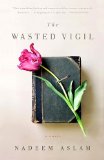Summary | Excerpt | Reading Guide | Reviews | Beyond the Book | Readalikes | Genres & Themes | Author Bio

The Great Buddha
Her mind is a haunted house.
The woman named Lara looks up at an imagined noise. Folding away the letter she has been rereading, she moves towards the window with its high view of the garden. Out there the dawn sky is filling up with light though a few of last night’s stars are still visible.
She turns after a while and crosses over to the circular mirror leaning against the far wall. Bringing it to the centre of the room she places it face up on the floor, gently, soundlessly, a kindness towards her host who is asleep in an adjoining room. In the mirror she ignores her own image, examining the reflection of the ceiling instead, lit by the pale early light.
The mirror is large—if it was water she could dive and disappear into it without touching the sides. On the wide ceiling are hundreds of books, each held in place by an iron nail hammered through it. A spike driven through the pages of history, a spike through the pages of love, a spike through the sacred. Kneeling on the dusty floor at the mirror’s edge she tries to read the titles. The words are reversed but that is easier than looking up for entire minutes would be.
There is no sound except her own slow breathing and, from outside, the breeze trailing its rippling robes through the overgrown garden.
She slides the mirror along the floor as though visiting another section of a library.
The books are all up there, the large ones as well as those that are no thicker than the walls of the human heart. Occasionally one of them falls by itself in an interior because its hold has weakened, or it may be brought down when desired with the judicious tapping of a bamboo pole.
A native of the faraway St. Petersburg, what a long journey she has made to be here, this land that Alexander the Great had passed through on his unicorn, an area of fabled orchards and thick mulberry forests, of pomegranates that appear in the border decorations of Persian manuscripts written one thousand years ago.
Her host’s name is Marcus Caldwell, an Englishman who has spent most of his life here in Afghanistan, having married an Afghan woman. He is seventy years old and his white beard and deliberate movements recall a prophet, a prophet in wreckage. She hasn’t been here for many days so there is hesitancy in her still regarding Marcus’s missing left hand. The skin cup he could make with the palms of his hands is broken in half. She had asked late one evening, delicately, but he seemed unwilling to be drawn on the subject. In any case no explanations are needed in this country. It would be no surprise if the trees and vines of Afghanistan suspended their growth one day, fearful that if their roots were to lengthen they might come into contact with a landmine buried near by.
She lifts her hand to her face and inhales the scent of sandalwood deposited onto the fingers by the mirror’s frame. The wood of a living sandal tree has no fragrance, Marcus said the other day, the perfume materialising only after the cutting down.
Like the soul vacating the body after death, she thinks.
Marcus is aware of her presence regardless of where she is in the house. She fell ill almost immediately upon arrival four days ago, succumbing to the various exhaustions of her journey towards him, and he has cared for her since then, having been utterly alone before that for many months. From the descriptions she had been given of him, she said out of her fever the first afternoon, she had expected an ascetic dressed in bark and leaf and accompanied by a deer of the wilderness.
She said that a quarter of a century ago her brother had entered Afghanistan as a soldier with the Soviet Army, and that he was one of the ones who never returned home. She has visited Afghanistan twice before in the intervening decades but there has neither been proof of life nor of death, until perhaps now. She is here this time because she has learnt that Marcus’s daughter might have known the young Soviet man.
Excerpted from The Wasted Vigil by Nadeem Aslam Copyright © 2008 by Nadeem Aslam. Excerpted by permission of Knopf, a division of Random House, Inc. All rights reserved. No part of this excerpt may be reproduced or reprinted without permission in writing from the publisher.
We should have a great fewer disputes in the world if words were taken for what they are
Click Here to find out who said this, as well as discovering other famous literary quotes!
Your guide toexceptional books
BookBrowse seeks out and recommends the best in contemporary fiction and nonfiction—books that not only engage and entertain but also deepen our understanding of ourselves and the world around us.